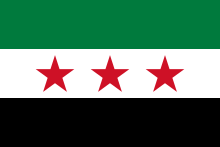
Back الائتلاف الوطني لقوى الثورة والمعارضة السورية Arabic Coalició Nacional Siriana Catalan ھاوپەیمانی نیشتمانیی بۆ ھێزەکانی شۆڕش و ئۆپۆزسیۆنی سووریا CKB Národní koalice sil revoluce a syrské opozice Czech Nationalkoalition syrischer Revolutions- und Oppositionskräfte German Εθνικός Συνασπισμός για τις Συριακές Επαναστατικές και Αντιπολιτευτικές Δυνάμεις Greek Coalición Nacional para las Fuerzas de la Oposición y la Revolución Siria Spanish ائتلاف ملی سوریه Persian Coalition nationale des forces de l'opposition et de la révolution French הקואליציה הלאומית הסורית של האופוזיציה והכוחות המהפכניים HE
This article needs to be updated. (July 2017) |
 | |
| Formation | 11 November 2012 (in Doha, Qatar) |
|---|---|
| Purpose | Opposition to and replacement of Bashar al-Assad and the government of Syria |
| Headquarters | Istanbul, Turkey[1] |
Region served | Syria |
Membership | Council of about 114 members[2] |
Official language | Arabic |
Secretary General | Haytham Rahmeh |
President | Hadi al-Bahra |
Vice Presidents | Abdulmajeed Barakat Abdulhakim Bachar |
Parent organization | Syrian opposition |
| Website | en |
 |
|---|

The National Coalition of Syrian Revolution and Opposition Forces (Arabic: الائتلاف الوطني لقوى الثورة والمعارضة السورية), commonly named the Syrian National Coalition (SNC) (Arabic: الائتلاف الوطني السوري), or the Syrian National Revolutionary Coalition (SNRC) is a coalition of opposition groups in the Syrian civil war that was founded in Doha, Qatar, in November 2012. Former imam of the Umayyad Mosque in Damascus, Moaz al-Khatib, considered a moderate, was elected the president of the coalition, and resigned on 21 April 2013.[3] Riad Seif and Suheir Atassi, both prominent democracy activists and the latter a secular human rights advocate, were elected vice presidents. The post of a third vice president will remain vacant for a Kurdish figure to be elected.[4] Mustafa Sabbagh was elected as the coalition's secretary-general.[5] The coalition has a council of 114 seats, though not all of them are filled.[2]
On 31 May 2013, the coalition gave membership to 15 representatives of the Free Syrian Army, allowing direct representation of rebels from Syria in a political group for the first time.[2] On 6 July, the coalition elected new leadership. Ahmad Asi Al-Jarba was elected president and Anas Al-Abdah was elected as secretary general. On 14 September 2013, the National Coalition selected Ahmad Tu'mah as prime minister of an interim government for Syria.[6] On 25 September 2013, some Islamist factions rejected the Syrian National Coalition stating that "All groups formed abroad without having returned to the country do not represent us."[7]
- ^ Hadi al-Bahra: President of a dead institution?
- ^ a b c "Syria Opposition Expands, Closes Meeting". Naharnet. 31 May 2013.
- ^ Black, Ian (21 April 2013). "Syria: opposition anger over US refusal to fund arms". The Guardian. London.
- ^ "Syria's opposition chooses president, formally signs coalition deal". Al Arabiya. Archived from the original on 20 November 2012. Retrieved 23 November 2012.
- ^ Rebhy, Abdullah (11 November 2012). "Syrian opposition groups reach unity deal". Associated Press. Retrieved 20 January 2014.
- ^ "Syrian opposition elects moderate Islamist as prime minister". Reuters. 14 September 2013. Retrieved 14 September 2013.
- ^ "Islamist rebels in Syria reject National Coalition". BBC News. 25 September 2013. Retrieved 27 September 2013.